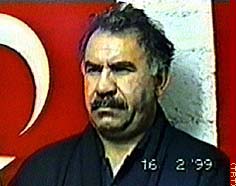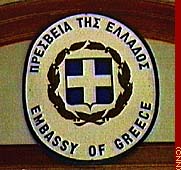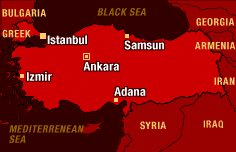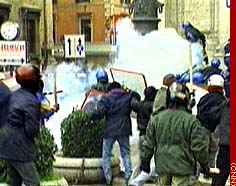

On a prison island near the southern shore of the Sea of Marmara, some 35 miles south of Istanbul, a rebel chief who led a bloody 15-year insurrection against the Turkish government will stand trial on charges of terrorism.
For Turks, it should be a moment of triumph: their nation's most-wanted man humbled before a court whose authority he shunned, facing trial for the deaths of more than 30,000, including civilians, Turkish soldiers and Kurdish guerrillas.
Abdullah Ocalan (pronounced URGE'ah-lohn), a man vilified in the Turkish media as a "baby killer," will finally answer to grieving relatives who blame him for the deaths of their loved ones.
But for Kurdish nationalists, Ocalan's trial, which begins May 31, offers an ironic opportunity. As their leader stands in chains, they can present the image of a repressive Turkey that crushed their dream of self-determination until only armed revolt could save them from cultural extinction.
Caught in the middle are the millions of Kurds who have sworn no allegiance to Ocalan and his separatist Kurdistan Workers' Party, the PKK, but who also have no affinity for Ankara's sovereignty. Most of them live in poverty, struggling to survive in Turkey's underdeveloped southeast. They pray that neither the Turkish army nor the PKK will come knocking on their doors for support. Taking sides makes one a quick target, but failure to choose can also result in torture or death.
Turkey is home to more than half the world's estimated 25 million Kurds. Others are scattered throughout the rugged reaches of Iran, Iraq and Syria. They see themselves as the largest ethnic group without a homeland, a people promised nationhood in the past, only to have it seized from their grasp. They are banned from teaching in their own language and were not officially recognized as a people in Turkey until 1991.
 |
|
| Ocalan was arrested after leaving the Greek embassy in Kenya | |
In 1978, left-wing Kurds under the direction of Ocalan founded the Marxist PKK, an organization whose goal was autonomy for Turkey's Kurds. The government beat the PKK to the brink of annihilation during the early 1980s.
But Ocalan fled to Syria, where in 1984 he and his supporters regrouped and declared war on the Turkish government.
The PKK launched a violent campaign aimed at weakening the government, following the examples of Peru's Shining Path and Cambodia's Khmer Rouge. PKK rebels allegedly have slaughtered thousands of Kurdish villagers who refused to support their cause, especially school teachers whom they blamed for spreading Turkish propaganda. They have ambushed police and soldiers and claimed responsibility for numerous bombings across the country, including tourist destinations.
In response, Turkey cracked down harshly. Local governors were granted sweeping powers to exterminate PKK influence in their provinces.

Turkish security forces reportedly have evacuated as many as 3,000 villages to keep them out of PKK hands. Hundreds of thousands of residents have been displaced. The government has begun to provide homes for these refugees, but human rights monitors say that effort has been inadequate.
After Ocalan's arrest February 15 outside the Greek Embassy in Kenya, Turkey reveled in its unexpected victory. But the celebration was subdued quickly by Kurdish uprisings across Europe. Almost immediately, Europeans who have shown little esteem for Turkey's human rights record issued calls for a fair trial.
Ankara already has inflamed European skepticism about the trial. It has barred international observers from the courtroom, limited Ocalan's access to his legal team and announced he would be tried not by a criminal tribunal, but by a State Security Court, a panel usually convened to hear cases dealing with national security.
 |
|
| Kurdish supporters clash with police during a Rome protest against Ocalan's arrest in February | |
The European Court of Human Rights claims this type of court is not independent because, along with two civilian judges, a military officer must sit on the tribunal. The fact that Ocalan could be sentenced to death only adds to Europe's disdain for Turkish justice.
"I think Turkey will be put under a microscope by Europe regarding its conduct of this trial, but quite honestly, I don't think European expectations that Turkey will meet Western European standards of justice are very high," said Alan Makovsky of the Washington Institute for Near East Policy.
"Very few people have any doubts about how this trial will come out," Makovsky said. "Most people recognize that the PKK was under Ocalan's direction and the PKK committed numerous acts of terrorism, and even those that don't think so will recognize that Turkey views it that way."
Turkey is not likely to heed to European opinion. Turks were aghast when Italy refused to extradite Ocalan when he appeared in Rome last November. After all, they asked, how could a Europe that prided itself on respect for justice protect a known "terrorist"?
|
Ankara is still simmering over its exclusion from the next group of candidates for European Union membership. Buoyed by strong support from the United States and a growing military alliance with Israel, Turkey may feel it can afford to ignore European criticism..
Its relations with neighboring Greece have deteriorated most rapidly. Turkey is enraged that Greek diplomats sheltered Ocalan at their embassy in Kenya and has accused Athens of training and supporting PKK fighters. In Greece, where many view Ocalan as a sort of folk hero, the trial will only stoke contempt for Turkey.
"We're in for choppy seas on the Aegean," Makovsky said.
The capture of Ocalan also has clouded prospects for reconciliation between Kurdish separatists and the Turkish government. In recent weeks, Kurdish rebels have intensified their attacks on major cities and warned tourists to stay away from Turkey.
The new wave of violence, Makovsky said, will hurt chances for serious dialogue, and it suggests the long-running dispute over Kurdish rights will not end with the trial of Abdullah Ocalan.